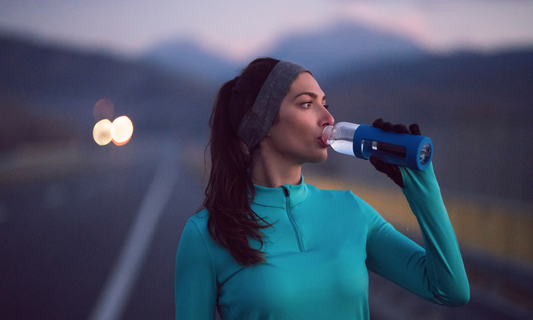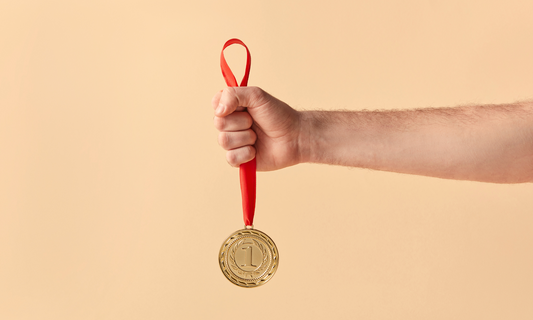Isotonic drink: Optimizing hydration for performance and recovery

A 2% weight loss due to dehydration during exercise reduces an athlete's physical capacity by 20%. Hydration before, during and after exercise is one of the keys not to be neglected for your sporting success.
What is good hydration?
Good hydration allows you not only to replace your water losses effectively, to replace the electrolytes (or mineral salts) lost during exercise but also to provide fast sugars to stimulate the metabolism.
The sport practiced, the intensity of the exercise and the environment of use (in particular external temperatures) will have an impact on the athlete's water needs. Sports drinks are particularly used in endurance efforts such as running, swimming or triathlon - but other drinks can be used for shorter efforts.
To learn more about the role of hydration in sport, you can consult the article “ Hydration in sport ”.
What is a sports drink?
Sports drinks are necessary for the proper hydration of the athlete before, during and after training.
In sports practice, the primary function of these drinks is to hydrate athletes while restoring electrolytes, carbohydrates , and other nutrients that have been used during exercise, so as to maintain or improve endurance performance . [The Impact of Sports and Energy Drinks in Performance]
They are made using essential electrolytes such as sodium, potassium, chloride, calcium, phosphate and magnesium, and are eliminated through sweat during training and/or competition.
Sports drinks can be classified into three types based on their osmolarity which depends on their carbohydrate and electrolyte content: hypotonic , isotonic and hypertonic drinks.
[An Overview of Functional Beverages]
What is osmolarity?
Osmolarity is a measure of the amount of osmotically active particles in a solution, such as sodium and glucose . The reference base for comparing osmolarity is that of the internal medium, blood plasma, in which dissolved substances "bathe": a drink is said to be isotonic when its osmolarity is close to that of blood plasma, hypotonic when it is lower than it, and hypertonic when it is higher.
In the mechanism of hydration, there is a movement of substances from the more concentrated solution (hypertonic) to the less concentrated solution (hypotonic) and the water goes in the opposite direction. [sante-et-nutrition.com]
Depending on the athlete's needs, he or she may therefore choose a drink with an appropriate osmolarity. However, it is not always easy to know what type of drink to use and when to use it.
When to use isotonic, hypotonic and hypertonic drinks?
- Hydrating drinks are recommended for all sports and even more so for endurance sports that can last several hours, such as marathons, triathlons or long-distance cycling ... Here are the characteristics, benefits and indications of each drink.
- Isotonic drinks have osmolarities ranging from 275 to 295 mOsm/kg of water. The carbohydrates and electrolytes (especially sodium) they contain have concentrations similar to those in the human body. Typically, an isotonic drink contains 8% carbohydrates.
This maximizes the rate at which glucose (energy) is absorbed by the body. The purpose of these drinks is to restore water, sugars and salts lost during sports. [A Comprehensive Study on Sports and Energy Drinks]
Use : Isotonic drinks are recommended during medium and long distance running as well as in sports with prolonged effort duration greater than 90 minutes and where dehydration and depletion of carbohydrate stores may limit performance. [An Overview of Functional Beverages]
- Hypotonic drinks have osmolarities below 275 mOsm/kg of water and contain only low levels of carbohydrates (sugars) and electrolytes (minerals, mainly sodium), lower than those of the human body. This low concentration of carbohydrates and sodium accelerates the absorption of water by the body, maximizing rehydration . [Product development of new soft drinks and fruit juices]
Use : Hypotonic drinks provide hydration by increasing voluntary fluid intake . They are ideal for rapid rehydration , when the goal is hydration rather than providing large amounts of energy.
They can be taken by gymnasts who need fluid without carbohydrate intake or during sports practice (e.g. football) of less than an hour and of low to moderate intensity . [An Overview of Functional Beverages]
They should be your go-to option for extended endurance efforts like marathons, long hikes in hot weather , when you need a drink to rehydrate quickly and effectively. [precisionhydration.com]
- Hypertonic drinks have osmolarities greater than 295 mOsm/kg water and contain higher levels of carbohydrates than the human body uses to replace those used during prolonged intense exercise and generally do not contain electrolytes. [An Overview of Functional Beverages]
Usage: Hypertonic drinks should not be used to maintain hydration as the high amount of carbohydrates will slow down gastric emptying and the time it takes for the drink to be absorbed into the intestine. These high carbohydrate drinks are ideal for supplementing your daily carbohydrate intake .
They can be taken after training, as a recovery drink , to improve muscle energy (glycogen) reserves and for ultra-distance running. [An Overview of Functional Beverages]
Hydratis, a hypotonic or isotonic drink enriched with minerals and trace elements
Hydratis was designed with the aim of promoting a sufficient level of hydration at all times when our needs are increased, particularly during sport.
The flexibility and ease of use offered by Hydratis, allows you to create a hypotonic or isotonic drink, enriched with mineral salts such as magnesium and potassium as well as trace elements such as zinc and manganese.
Potassium contributes to maintaining good cellular hydration. Magnesium and potassium contribute to good muscle function by reducing physical fatigue and preventing cramps. Zinc contributes to the proper functioning of the immune system and supports metabolism in times of mild dehydration. Manganese has antioxidant properties to combat oxidative stress in cells. [The Hydratis formulation]
Hydratis offers you the possibility of using an isotonic or hypotonic drink depending on your needs: for an isotonic drink we advise you to put 2 tablets in a glass of water and for a hypotonic drink 1 tablet in a glass of water.
Hydratis contains no coloring or preservatives, it is a vegan and gluten-free product.











